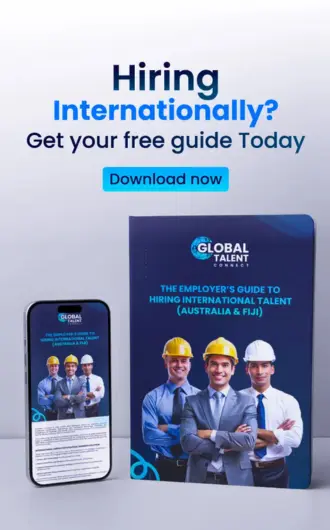Across Australia, industries like healthcare, construction, hospitality, and technology continue to face a shortage of skilled workers. In March 2025, 43% of employers reported hiring challenges, with these key sectors still struggling to find the right talent (Jobs and Skills Australia, 2025) .
To fill these gaps, many Australian companies are hiring overseas workers. This approach offers access to new skills, more diverse teams, and global perspectives. It can also help businesses grow faster and operate more flexibly.
Of course, hiring overseas employees comes with responsibilities, from legal compliance and payroll to cultural integration. But with the right approach, it can be a smart, sustainable way to build a stronger workforce.
This article walks you through the key considerations when hiring overseas workers, helping employers build confident and compliant international hiring strategies.
Types of Overseas Workers and What They Mean for Your Business
Before hiring someone from abroad, it’s important to understand the different categories of overseas workers. Each one comes with its own legal, visa, and payroll requirements.
1. Foreign Nationals Working in Australia
These are foreign workers who come to work in Australia on official work visas such as the Skills in Demand Visa (Subclass 482) or the Employer Nomination Scheme (ENS 186).
Employers must:
- Verify the person’s visa and work rights in Australia through VEVO (Visa Entitlement Verification Online).
- Register as an approved sponsor if required.
- Follow the Fair Work Act and ensure pay, hours, and entitlements meet Australian labour laws.
- Keep employment contract, visa and payroll records up to date
Failing to meet sponsorship or employment obligations can lead to fines or losing your ability to sponsor future workers.
2. Remote Workers Based Overseas
The rise of digital collaboration means many Australian businesses now hire remote international employees who remain in their home country. When hiring remote overseas employees, employers should:
- Clearly state which country’s labour laws apply in the contract.
- Follow local tax and employment law where the employee lives.
- Protect personal data in line with the Privacy Act 1988 (Cth).
Many businesses use Employer of Record (EOR) services to manage payroll, compliance, and entitlements without setting up a legal entity overseas. This simplifies global hiring and reduces risk.
Legal and Compliance Considerations for Global Hiring
Hiring internationally means managing multiple sets of rules. Australian employers must comply with local employment law and, in some cases, the laws of another country.
Australian Immigration and Employment Law
If you hire someone to work in Australia, you must meet sponsorship and visa requirements. The main options include:
- Subclass 482 Visa – for skilled temporary workers. Under this visa, short-term stream workers can stay for up to 2 years, while medium-term stream workers can stay for up to 4 years.
- ENS 186 Visa – for permanent skilled roles
- Labour Agreements – for industries facing specific shortages
Employers must:
- Confirm visa validity and work rights
- Treat international employees the same as local employees under the Fair Work Act
- Keep accurate records and notify the Department of Home Affairs of any changes
This ensures compliance and protects your business from legal issues.
International Employment Laws
If your overseas employees stay in their own country, they may be covered by their local laws. This can affect pay, leave, and termination rules.
To ensure proper compliance:
- Write clear employment contracts that specify which country’s laws apply.
- Partner with an Employer of Record or a local legal expert to manage compliance and payroll.
- Seek advice before hiring to meet legal requirements and avoid cross-border disputes.
This approach reduces legal risk, ensures fair working conditions, and supports a positive employment relationship with your international hires.
Tax, Payroll, and Superannuation Obligations
Getting payroll right is a key part of hiring workers from overseas.
For employees in Australia:
- You’ll need to manage PAYG withholding, superannuation, and entitlements.
For remote international employees:
- Payroll and tax obligations depend on the employee’s home country.
- Double taxation agreements can help avoid paying tax twice.
Many employers use global payroll systems or EOR services to manage multi-currency payments and stay compliant.
Data Privacy, Intellectual Property, and Insurance
International hiring involves more than payroll. You also need to protect your business and your employees.
Employers should:
- Follow the Privacy Act 1988 (Cth) when handling personal data across borders.
- Include intellectual property and confidentiality clauses in employment contracts.
- Review insurance coverage for international assignments.
These steps help protect company assets and keep employment relationships clear and fair.

Recruitment and Hiring Best Practices
Attracting and Screening Talent
A successful global hiring strategy starts with a clear plan. Tips to attract and screen international talent:
- Advertise on global job boards like LinkedIn and SEEK International
- Partner with trusted recruitment agencies
- Conduct remote interviews and skills assessments
- Verify qualifications and references carefully
Agencies like Global Talent Connect (GTC) help employers in Australia recruit ethically and efficiently, ensuring compliance at every step.
Cultural Fit and Communication
Technical skills are important, but cultural fit matters just as much when building international teams.
- Use behaviour-based interviews to understand teamwork and adaptability.
- Assess English proficiency and communication skills.
- Offer cultural awareness and remote work training for both local workers and international hires.
Good cultural alignment builds stronger teams and improves retention.
Onboarding and Integration
Onboarding plays a big role in how well overseas employees adapt. A clear and supportive process sets the tone for success.
A good onboarding plan includes:
- A structured orientation program on company policies and work rights.
- Assigning mentors or workplace buddies
- Cultural training and support
- Regular feedback sessions
Research from SHRM shows structured onboarding can increase retention by up to 70%. When employees feel supported, they’re more likely to stay and thrive (Society for Human Resource Management, 2022).
Financial and Operational Considerations
Hiring international employees requires planning, but it also opens doors to big opportunities. Employers should budget for:
- Visa and sponsorship fees, which can exceed AUD $10,000 per person.
- Relocation and housing costs if employees move to live and work in Australia.
- Competitive pay packages that follow employment law and match local labour rates.
- Technology investments for collaboration and hiring remote setups.
While there may be upfront costs, the long-term benefits, like access to global skills, increased innovation, and market growth, often outweigh them.
Using an EOR or payroll provider can also help manage costs and reduce administrative work
Risks and Common Pitfalls
Bringing in foreign workers and hiring globally can be rewarding, but there are potential pitfalls:
| Risk | Potential Problem | Solution |
| Not checking work rights | Visa cancellation or fines | Verify through VEVO before hiring |
| Ignoring Fair Work or local laws | Penalties or disputes | Seek HR/legal guidance |
| Misclassifying contractors | Tax and compliance issues | Use clear written contracts |
| No IP protection | Loss of business ownership | Include IP clauses in contracts |
| Poor cultural understanding | Low morale or turnover | Provide cultural training |
Avoiding these pitfalls helps ensure a compliant, ethical, and sustainable international workforce.
Tools and Resources for Employers
Using the right tools saves time, money, and legal headaches. These tools can make international hiring smoother:
- Employer of Record (EOR): Handles payroll, compliance, and HR.
- Global Payroll Platforms: Manage payments across multiple countries.
- Legal & HR Consultants: Provide tailored advice on employment law.
- Government Resources:
- Department of Home Affairs – Visas & Sponsorship
- Fair Work Ombudsman – Overseas Workers
- Australian Taxation Office – International Employment

FAQs About Hiring International Employees
Do I Need to Sponsor a Visa for Every Overseas Hire?
No. Sponsorship is only required if the worker relocates to Australia under a visa program. Remote workers abroad usually don’t need it.
Are Overseas Employees Entitled to Australian Workplace Rights?
Yes, if they work within Australia. Remote staff working overseas are generally covered by their home country’s labour laws.
How Do I Manage Payroll for Remote International Staff?
A global payroll provider or EOR can handle taxes and payments securely.
Can I Hire an Employee Abroad Without Registering in That Country?
Yes, in many cases through an EOR, which acts as the legal employer on your behalf.
What Are the Risks of Hiring Overseas Workers Without Legal Compliance?
You may face fines, visa cancellations, or reputational damage.
Conclusion
Hiring international employees gives Australian companies a powerful way to overcome skills shortages, build diverse teams, and grow globally.
Yes, there are legal and compliance steps to follow, but with the right structure and support, it can be a smooth and rewarding process.
Employers should:
- Understand visa and legal obligations
- Use fair and clear contracts
- Support overseas employees through onboarding and communication
- Work with experienced partners like migration experts, legal advisors, or Global Talent Connect (GTC)
With the right strategy, hiring overseas can strengthen your business and create long-term opportunities.
Ready to Start Hiring Workers From Overseas?
Partner with Global Talent Connect (GTC) to recruit, onboard, and support overseas employees with full compliance and confidence.




